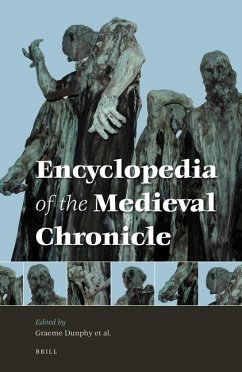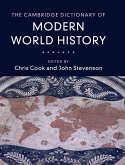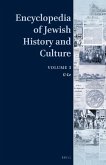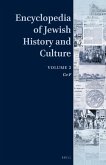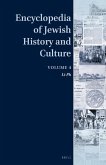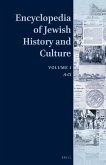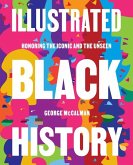The Encyclopedia of the Medieval Chronicle brings together the latest research in chronicle studies from a variety of disciplines and scholarly traditions. Chronicles are the history books written and read in educated circles throughout Europe and the Middle East in the Middle Ages. For the modern reader, they are important as sources for the history they tell, but equally they open windows on the preoccupations and self-perceptions of those who tell it. Interest in chronicles has grown steadily in recent decades, and the foundation of a Medieval Chronicle Society in 1999 is indicative of this. Indeed, in many ways the Encyclopedia has been inspired by the emergence of this Society as a focus of the interdisciplinary chronicle community.
The Encyclopedia fills an important gap especially for historians, art historians, and literary scholars. It is the first reference work on medieval chronicles to attempt this kind of coverage of works from Eruope, North Africa, and the Middle East over a period of twelve centuries. 2564 entries escribe individual anonymous chronicles or the historical oeuvre of particular chroniclers, covering the widest possible selection of works written in Latin, English, French, Spanish,German, Dutch, Norse, Irish, Hebrew, Arabic, Greek, Syriac, Church Slavonic and other languages. Leading articles give overviwes of genres and historiographical traditions, and thematic entries cover particular features of medieval chronicles and such general issues as authorship and patronage, as well as questions of art history. Textual transmission is emphasized, and a comprehensive manuscript index makes a useful contribution to the codicology of chronicles.
Also available online, individually asEncyclopedia of the Medieval Chronicle Online and as part of Brill's Medieval Reference Library Online.
The Encyclopedia fills an important gap especially for historians, art historians, and literary scholars. It is the first reference work on medieval chronicles to attempt this kind of coverage of works from Eruope, North Africa, and the Middle East over a period of twelve centuries. 2564 entries escribe individual anonymous chronicles or the historical oeuvre of particular chroniclers, covering the widest possible selection of works written in Latin, English, French, Spanish,German, Dutch, Norse, Irish, Hebrew, Arabic, Greek, Syriac, Church Slavonic and other languages. Leading articles give overviwes of genres and historiographical traditions, and thematic entries cover particular features of medieval chronicles and such general issues as authorship and patronage, as well as questions of art history. Textual transmission is emphasized, and a comprehensive manuscript index makes a useful contribution to the codicology of chronicles.
Also available online, individually asEncyclopedia of the Medieval Chronicle Online and as part of Brill's Medieval Reference Library Online.
"This encyclopedia should be the first port of call for any scholar or student beginning work on a medieval chronicle [...] [the volumes are] destined to become standard works of reference not only for historians but for anyone interested in the cultural and intellectual history of the Middle Ages."
Rosalind Brown-Grant, Modern Language Review 107 (2012), 1226-28.
"A fine reference work is useful for specific searches as well as general edification. In both instances, the Encyclopedia lives up to its high standards. This work will stand and serve proudly next to other reference works in any medieval and/or medievalist's library. It promises to stimulate much work in the field of chronicle studies, and beyond. Dunphy and his coworkers are to be both thanked and congratulated."
John Jeep, Mediaevistik, 24 (2012), 381-383.
"EMC reflects the widened scholarly interest of our times in medieval narratives [...] A major strength of the EMC is that the entries point out the historical and often political importance of the narrative [...] Scholarly controversies about date, authorship or textual tradition are also frequently reported, authors often coming down on one side or the other, which is very refreshing in a handbook. These all seem to me to be the most valuable aspects of EMC, especially when one consults it for a text one knows little about. Considering the wide coverage, there would be many of those for most of us! [...] One should page [these volumes] not only for reference, but for exciting reading about books and manuscripts one had never heard of before."
János Bak, The Medieval Review, August 2010.
"Die allergroßte Stärke dieser Publikation ist aber die Interdisziplinaraität und der komparatistische Ansatz, die es den hochspezialisierten Fachkollegen auf unkomplizierte Art und Weise ermöglichen, über den engeren Horizont ihrer eigenen fachlichen Spezialisierung hinausublicken und eine weiter gespannte 'Kulturgeschichte der Chronistik' ins Auge zu fassen."
Thomas Pratsch, Das Altertum, 59 (2014), 234.
"EMC einen gegenüber herkömmlichen Lexika weitaus höheren Grad an Vernetzung zwischen den einzelnen Lemmata und bietet Hintergrundinformationen, an deren Vermittlung traditionelle Sammelwerke in der Regel scheitern [...]überhaupt nicht zu bezweifeln, dass sich die EMC [...] als eine großartige organisatorische, konzeptionelle und inhaltliche Leistung in der Forschung etablieren und zukünftig ein zentrales Referenzwerk darstellen wird."
Mischa Meier, sehepunkte, 13 (2013), Nr. 6.
"Die größte Stärke der Beiträge liegt wohl darin, dass sie dem Benutzer auf einen Blick alle wichtigen Informationen zu Werk und Verfasser sowie zur jeweiligen Forschungslage zur Verfügung stellen [...] Zusammenfassend lässt sich festhalten, dass die von der Medieval Chronicle Society angeregte Enzyklopädie eine lang ersehnte und deswegen hoch willkommene Publikation darstellt, der eine breite Leserschaft zu wünschen ist."
Johannes Bernwieser, IASL-Online, 2012.
"Cette encyclopédie est très utile pour le chercheur. Tout d'abord, elle donne un aperçu rapide de chaque chronique, avec l'édition la plus récente ainsi qu'une bibliographie. Les références des manuscrits permettent au chercheur de se référer aux originaux encore conservés pour y faire de nouvelles études codicologiques et paléographiques, ce qui est particulièrement pertinent pour des chroniques peu étudiées. La bibliographie est récente et actualise les références. Par ailleurs, les auteurs ont mis en ligne une édition électronique en 2012 avec des ajouts et mises à jour des informations contenues dans l'encyclopédie sur le site de l'éditeur. Pour certaines chroniques, l'accès est facilité car tous les articles sont écrits en anglais et donnent une vue synthétique du contenu. Cette encyclopédie est un nouvel outil pour les chercheurs, mais aussi pour les étudiants de nombreuses disciplines et elle comble sans aucun doute un manque."
Claire de Cazanove, Francia-Recensio, 2012.
"Encyclopedia of the Medieval Chronicle est le premier ouvrage de reference concernant de manière spècifique les chroniques médiévales [...] L'ouvrage est conçu à la fois comme un dépôt de renseignements et comme un outil de recherche [...] La prise en compte de l'historiographie arabe, persane et juive représente sans aucun doute un des éléments les plus remarquables de l'ouvrage [...] L'Europe centrale et de l'Est est également mieux representee que dans d'autres répertoires de ce genre [...] Un autre trait caractéristique de l'ouvrage est la riche série d'articles thématiques [...] [Les contributeurs rend] un excellent service à tous ceux qui intéressés par les écrits historiques médiévaux, en leur mettant à disposition un outil de travail indispensable. "
Andrei Timotin, Revue des Etudes Sud-Est Européennes / Journal of South-East European Studies, 50 (2012), 365-366.
Rosalind Brown-Grant, Modern Language Review 107 (2012), 1226-28.
"A fine reference work is useful for specific searches as well as general edification. In both instances, the Encyclopedia lives up to its high standards. This work will stand and serve proudly next to other reference works in any medieval and/or medievalist's library. It promises to stimulate much work in the field of chronicle studies, and beyond. Dunphy and his coworkers are to be both thanked and congratulated."
John Jeep, Mediaevistik, 24 (2012), 381-383.
"EMC reflects the widened scholarly interest of our times in medieval narratives [...] A major strength of the EMC is that the entries point out the historical and often political importance of the narrative [...] Scholarly controversies about date, authorship or textual tradition are also frequently reported, authors often coming down on one side or the other, which is very refreshing in a handbook. These all seem to me to be the most valuable aspects of EMC, especially when one consults it for a text one knows little about. Considering the wide coverage, there would be many of those for most of us! [...] One should page [these volumes] not only for reference, but for exciting reading about books and manuscripts one had never heard of before."
János Bak, The Medieval Review, August 2010.
"Die allergroßte Stärke dieser Publikation ist aber die Interdisziplinaraität und der komparatistische Ansatz, die es den hochspezialisierten Fachkollegen auf unkomplizierte Art und Weise ermöglichen, über den engeren Horizont ihrer eigenen fachlichen Spezialisierung hinausublicken und eine weiter gespannte 'Kulturgeschichte der Chronistik' ins Auge zu fassen."
Thomas Pratsch, Das Altertum, 59 (2014), 234.
"EMC einen gegenüber herkömmlichen Lexika weitaus höheren Grad an Vernetzung zwischen den einzelnen Lemmata und bietet Hintergrundinformationen, an deren Vermittlung traditionelle Sammelwerke in der Regel scheitern [...]überhaupt nicht zu bezweifeln, dass sich die EMC [...] als eine großartige organisatorische, konzeptionelle und inhaltliche Leistung in der Forschung etablieren und zukünftig ein zentrales Referenzwerk darstellen wird."
Mischa Meier, sehepunkte, 13 (2013), Nr. 6.
"Die größte Stärke der Beiträge liegt wohl darin, dass sie dem Benutzer auf einen Blick alle wichtigen Informationen zu Werk und Verfasser sowie zur jeweiligen Forschungslage zur Verfügung stellen [...] Zusammenfassend lässt sich festhalten, dass die von der Medieval Chronicle Society angeregte Enzyklopädie eine lang ersehnte und deswegen hoch willkommene Publikation darstellt, der eine breite Leserschaft zu wünschen ist."
Johannes Bernwieser, IASL-Online, 2012.
"Cette encyclopédie est très utile pour le chercheur. Tout d'abord, elle donne un aperçu rapide de chaque chronique, avec l'édition la plus récente ainsi qu'une bibliographie. Les références des manuscrits permettent au chercheur de se référer aux originaux encore conservés pour y faire de nouvelles études codicologiques et paléographiques, ce qui est particulièrement pertinent pour des chroniques peu étudiées. La bibliographie est récente et actualise les références. Par ailleurs, les auteurs ont mis en ligne une édition électronique en 2012 avec des ajouts et mises à jour des informations contenues dans l'encyclopédie sur le site de l'éditeur. Pour certaines chroniques, l'accès est facilité car tous les articles sont écrits en anglais et donnent une vue synthétique du contenu. Cette encyclopédie est un nouvel outil pour les chercheurs, mais aussi pour les étudiants de nombreuses disciplines et elle comble sans aucun doute un manque."
Claire de Cazanove, Francia-Recensio, 2012.
"Encyclopedia of the Medieval Chronicle est le premier ouvrage de reference concernant de manière spècifique les chroniques médiévales [...] L'ouvrage est conçu à la fois comme un dépôt de renseignements et comme un outil de recherche [...] La prise en compte de l'historiographie arabe, persane et juive représente sans aucun doute un des éléments les plus remarquables de l'ouvrage [...] L'Europe centrale et de l'Est est également mieux representee que dans d'autres répertoires de ce genre [...] Un autre trait caractéristique de l'ouvrage est la riche série d'articles thématiques [...] [Les contributeurs rend] un excellent service à tous ceux qui intéressés par les écrits historiques médiévaux, en leur mettant à disposition un outil de travail indispensable. "
Andrei Timotin, Revue des Etudes Sud-Est Européennes / Journal of South-East European Studies, 50 (2012), 365-366.

